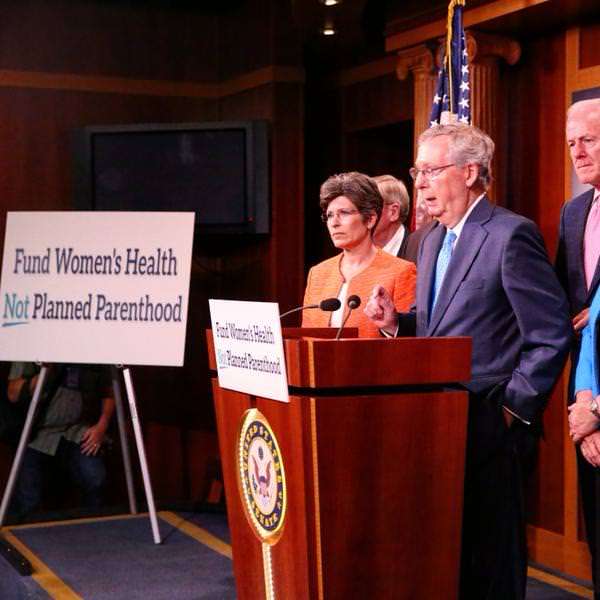Libertarians Should Look Twice at Planned Parenthood Defunding Efforts
GOP move to "defund Planned Parenthood" isn't all it's cracked up to be.


As soon as next Monday, the U.S. Senate may vote on whether to nix all federal funding for Planned Parenthood Federation of America (PPFA), the organization responsible for operating hundreds of reproductive health-care clinics around the country. Senate Majority Leader Mitch McConnell (R-Ky.) and Sen. Joni Ernst (R-Iowa) have been leading a group of GOP senators in crafting and promoting legislation to "defund Planned Parenthood," which has long been a target of conservative ire because some of its clinics perform abortions.
Sen. Rand Paul (R-Ky.) has also been backing the measure, telling The Washington Post that lawmakers are "energized and excited" about the prospect for a vote. "If we get 54 Republicans and three or four Democrats, well, that's 58 votes," said Paul. "We can build on that." Sixty votes are needed for the measure to pass.
Libertarians on all sides of the abortion debate tend to find fault with the hefty government funding Planned Parenthood receives—to the tune of more than $500 million annually, between state and federal sources. The money is mostly barred from being used for abortions, but that's not necessarily a comfort from a fiscal perspective.
Yet GOP efforts to cut back on PPFA funding will likely provide little comfort to libertarians, either. Some Republicans have been proposing that the funding not be cut but simply transferred to nonprofit "crisis pregnancy centers," which provide things like pregnancy tests, counseling, and baby clothes to pregnant women but do not offer abortions (or any sort of medical care).
Further complicating things is the fact that much of Planned Parenthood's funding comes in the form of Medicaid reimbursement. To stop Planned Parenthood from getting that money, Congress would have to bar Medicaid patients from visiting there for generally covered services such as contraception, sterilization, and HPV vaccines. Ostensibly, Medicaid patients would go elsewhere for these services, saving nothing overall while imposing an arbitrary restraint on patient choice.
Planned Parenthood was recently the subject of a sting operation designed to portray the organization's fetal-tissue collection programs as illegally profiting from the sale of human body parts. A third video from the operations was released this week, and features a woman who says she worked for a company that harvested organs from aborted fetuses provided by Planned Parenthood. Since then, Planned Parenthood says its website has been downed twice by hackers using distributed denial of service (DDoS) attacks. Meanwhile, the Los Angeles Superior Court issued a temporary restraining order preventing the group behind the videos, the Center for Medical Progress, from releasing footage featuring executives from California company StemExpress, which provides researchers with fetal tissue; and Planned Parenthood is asking the National Institutes of Health to convene a panel to study issue surrounding fetal tissue research.

Planned Parenthood clinics don't seem to be doing anything illegal, at least not broadly. Women who have abortions may lawfully donate the fetal tissue for scientific research, and clinics are allowed to receive reimbursement for the cost of things such as storage and transportation. In 1988, the Reagan administration banned the donation of fetal tissue from elective abortions, but the moratorium was lifted by Congress in 1993 as part of the National Institutes of Health Revitalization Act. Several Republicans who have recently condemned Planned Parenthood for its fetal tissue program—including Sen. McConnell—voted for the 1993 bill.
Regardless, the videos have sparked heated discussion on fetal tissue research and abortion more broadly. And Republicans quickly seized on the opportunity to push for blocking Planned Parenthood from receiving federal aid.
Hillary Clinton—who has been getting blasted by Paul for getting donations from Planned Parenthood—called the videos "disturbing," but pointed out that Planned Parenthood "has done a lot of really good work for women: cancer screenings, family planning, all kinds of health services." Showing a bit more vim and vigor, Senate Minority Leader Harry Reid (D-Nev.) on Tuesday tweeted: "To Republicans who are trying to defund Planned Parenthood: Good luck with that."
Never one to miss a "war on women" rallying cry, Reid added that "Republican efforts to defund Planned Parenthood are just another GOP attack on women's health."
But Reid may be semi-right in this case. Congressional Republicans aren't really opposing Planned Parenthood funding on limited-government leanings. And while they pretend this is a blow against abortion, the money Planned Parenthood gets from the government is to subsidize non-abortion services only—things like cervical cancer screenings, STD testing, and writing birth-control prescriptions for low-income women. Some Republicans, meanwhile, want to give that money to groups that give little more than faith-based pregnancy advice.
What's more likely is a bill that simply tells Medicaid patients to stay away from Planned Parenthood clinics, and redistributes all grant money going to Planned Parenthood to other women-focused health groups. "Funds no longer available to Planned Parenthood will continue to be offered to other eligible entities to provide such women's health care services," Senate Republicans said in a statement.

But wait a second… if everyone is supposed to have health insurance these days, doesn't that mean everyone already has access to subsidized gynecological exams, sexual health screenings, and birth control? Indeed. Obviously not everyone has health insurance in actuality, but the client pool for free clinics that provide these services still must have shrunk in the wake of the Affordable Care Act. Allowing birth control pills to be sold over-the-counter could help shrink it further. I'm not saying the need for low-cost women's health services is now or would be nonexistent, but these organizations can (and do) also receive funding from local governments, private foundations, and religious groups.
Perhaps more diverse funding would spawn more diverse options, instead of contributing to this sort of reproductive-health monolith situation we have now. Part of the reason Planned Parenthood in particular attracts so much pro-life attention is that it's become the symbol of all abortion providers in America. Ironically, the pro-life movement helped bring about this situation. With the ever-increasing (and unnecessary) regulations abortion clinics are subject to, and the constant threat they face of being shut down by state governments, only those big and powerful enough to afford compliance and/or lawsuits have been able to survive. Taken together with its institutionalized support, its no wonder Planned Parenthood has become the what it is today.
For the record, I think Planned Parenthood clinics do a lot of good. But as a lobbying group, which it is as well, the organization has been as gross as any other, launching attacks on policies that might be good for low-income women but bad for its own bottom line. Most recently, the organization has been opposing proposals to make birth control pills available over-the-counter (OTC), asserting that this would decrease women's "access" to birth control.
It's the same strange logic seen from Democrats, who say prescription-free pills would be more expensive for women since we all get "free" birth control now under Obamacare. Of course, there's nothing saying OTC pills must come at the expense of the contraception mandate, nor that they would obviate the market for prescription pills. But what's interesting is that the liberal logic here rests on a world where all women have free access to birth control through their insurance plans—plans which would then, by definition, also cover other preventative care of the kind provided by Planned Parenthood. So which is it? Are "well-woman" services outside of the traditional doctor/insurance scheme totally unnecessary now that we have Obamacare, or an absolutely vital component to women's health?
I guess this is the point in the post where I've reached "a pox on both their houses" territory. And we can expect the political circus around this to get much worse before anything productive happens. If Senate Republicans can't get enough votes to pass the Planned Parenthood defunding bill, their counterparts in the House are threatening not to support any government spending bill that provides money to PPFA.
"Please know that we cannot and will not support any funding resolution—an appropriations bill, an omnibus package, a continuing resolution or otherwise—that contains any funding for Planned Parenthood, including mandatory funding streams," House Republicans wrote in a letter Wednesday.
We're due for the much-hyped "government shutdown" in two months if Congress doesn't pass any new appropriations bills, so Republicans and Democrats are going to have to come together on this one eventually. But I suspect we're in for a lot of hyperbolic headlines, heated abortion debates, and war-on-women rhetoric in the meantime, and—whether Planned Parenthood is eventually cut off or not—a solution that somehow perfectly maintains the status quo.


Show Comments (394)